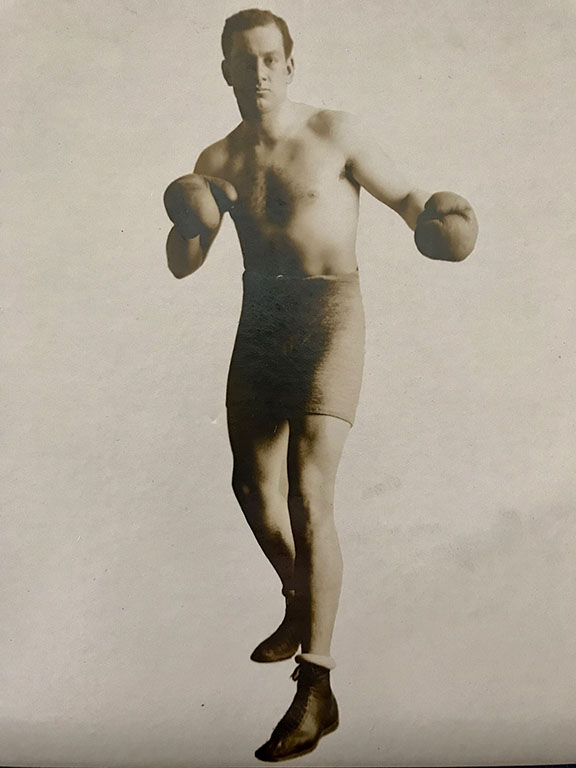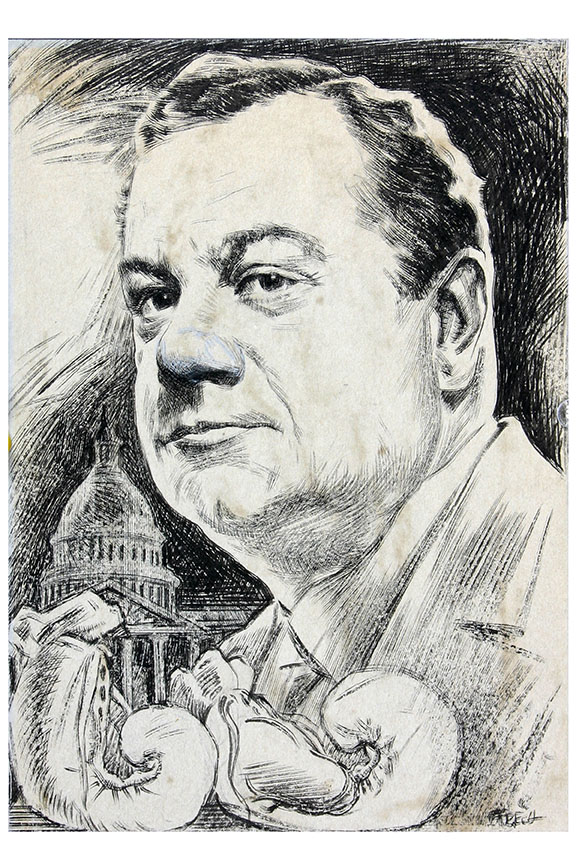Born in Monmouth Beach, Sen. W. Warren Barbour served as a councilman and mayor of Rumson before entering Congress. Throughout his life, he was a passionate advocate for equal rights for all citizens. In 1943, he introduced a bill in Congress that would have given refuge in the United States to 100,000 Jews and other minorities targeted by the Nazis for the duration of the war.
Photo courtesy The Jewish Historical Society of North Jersey
By Eileen Moon
It was a time of racial, ethnic and religious divides; a time of turmoil marked by protests and polarization over immigration, threats of war and worries over economic uncertainty.
For Jews and other minorities targeted by the Nazis, the madness spreading across Europe in the 1930s and 1940s was a death sentence.
As the rest of the world argued about what to do, whether to intervene or isolate, whether to opt for conscience or complacency, some spoke out loud and clear.
Among them was Monmouth Beach-born W. Warren Barbour, a former mayor of Rumson, former World Heavyweight Amateur Boxing Champion and finally, a distinguished senator from New Jersey.
On Sunday, Nov. 3, the Jewish Historical Society of North Jersey will honor Barbour for his Holocaust rescue efforts with a reception and lecture about Barbour’s life and achievements by Rafael Medoff, executive director of the David S. Wyman Institute for Holocaust Studies in Washington D.C.

Photo courtesy The Jewish Historical Society of North Jersey
During his years in Congress, Barbour was a strong advocate for social justice and religious tolerance. “There can be no peace until human beings recognize the rights of others less fortunate than they are or who possess different religions or philosophies,” he wrote. “Enduring peace will be found only in the doctrine of ‘live and let live.’ ’’
Although he came from a wealthy family – his father was the founder of the Barbour Linen Thread Company in Paterson – he forged a unique path to Congress that included rejecting a Princeton education in favor of the family business and a boxing career that led to his triumph as the World Champion Amateur Heavyweight Boxing Champion in 1910.
After his father’s death in 1917, Barbour took over the presidency of the family firm. A few years later, he embarked on a political career.
A Republican like his father before him, Barbour was elected to the Rumson Borough Council in 1922 and became mayor of Rumson in 1923 – a position he held until 1928.
In 1927, Barbour donated his family home to the borough in memory of his parents. In 1929, the building at 80 River Road became the town’s first borough hall. Prior to that, the mayor and council met in the firehouse on Center Street. The Barbour donation served as the center of borough operations until 2008, when a new building took its place.
Appointed to the Senate to fill the unexpired term of Dwight Morrow in 1931, Barbour served until 1936, when a Democratic landslide led by Franklin Delano Roosevelt swept him out of office. He returned to the Senate in 1938 when he was appointed to fill the unexpired term of John G. Milton.
As his prominence grew, Barbour’s remarks in Congress became the genesis of a newspaper column echoing his advocacy for social justice and equality.
In October 1943, Barbour and a handful of his fellow legislators met with a group of 400 rabbis who had marched in Washington to demand that the U.S. government intervene in the Holocaust. Days later Barbour introduced a bill proposing that the U.S. allow 100,000 refugees under threat by Hitler to enter the U.S. and stay for the duration of the war.

Photo courtesy The Jewish Historical Society of North Jersey
Before the bill could proceed, Barbour suffered a heart attack, dying in office Nov. 22, 1943. He was 55.
For decades, his history rested quietly in various archives. Browsing through the digital copies of a Jewish newspaper published in the Paterson area one day, JHSNJ president Richard Polton happened upon a page containing a column by Sen. Barbour outlining his argument for tolerance and equality.
Fur ther research revealed much more about Barbour and his connection to Paterson through the Barbour Linen Thread Mill.
Sharing the story with fellow members of the society, Polton garnered support for the idea of honoring Barbour and sharing his story. The society was able to raise the money to hire Medoff to conduct fur ther research on Barbour and prepare a lecture in his honor.
“Prior to (World War II), the public was over whelmingly against additional immigration,” Medoff noted in emailed comments regarding his research. “There was also strong opposition to getting involved in the war. The general attitude was that the U.S. should not get mixed up in Europe’s problems.”
Public opinion began to shift in late 1943 and early 1944. “With the defeat of the Germans at Stalingrad and the surrender of Italy and other developments, many Americans felt more secure in the likelihood of victory and more willing to extend a helping hand,” he continued.
Medoff will share details of his research during his lecture Nov. 3. The lecture will take place in a portion of the former Barbour Mill, now the Art Factory, at 70 Spruce St., Paterson. The lecture is free but reser vations are recommended. Members of Barbour’s family will attend the event.
“Here we are in 2019 and the issues of tolerance are still completely relevant,” noted Polton. “It’s just an incredible story. Here’s a man who really stepped outside of what you would imagine were the prevailing attitudes of his milieu in a progressive way.”
“It really is an untold story about this man who qualified to be a ‘Righteous Gentile,’” said Joy Kurland, JHSNJ executive director.
For reservations and information on the program, contact the Jewish Historical Society of North Jersey at 201-300-6590 or email jhsnj@gmail.com.














